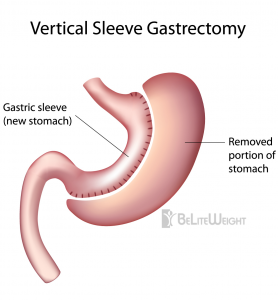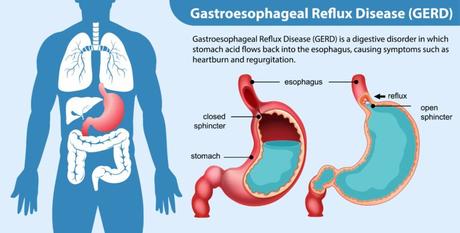The gastric sleeve Revision, also known as sleeve gastrectomy, has become increasingly popular as a bariatric surgery option for those seeking significant weight loss and health improvements. As with all surgeries, however, there can sometimes be complications or suboptimal results. For these cases, a gastric sleeve revision In USA might be considered. Here, we delve deeper into what gastric sleeve revision is, why it may be needed, and what one can expect from the procedure.

A gastric sleeve revision is a secondary procedure performed after an initial sleeve gastrectomy. This operation aims to correct or improve upon issues that might have arisen after the first surgery, or to assist patients who haven't achieved their desired weight loss results.
A. Inadequate Weight Loss

- Technical Failures during Initial Surgery: In some cases, the initial gastric sleeve revision in USA may not have been performed correctly, leading to reduced weight loss results.
- Patient-Related Factors: Individual factors such as genetics, metabolism, adherence to dietary guidelines, and physical activity levels can impact weight loss success.
B. Complications and Side Effects
- Staple Line Leakage: The staple line used to close the remaining stomach tissue can sometimes develop leaks, leading to infections and other complications.
- Gastroesophageal Reflux Disease (GERD): Some patients may develop GERD, characterized by acid reflux and heartburn, after the surgery.

- Strictures or Narrowing: Scar tissue formation can lead to the narrowing of the sleeve, causing discomfort and difficulty in eating.
- Sleeve Dilation over Time: In some cases, the stomach sleeve can stretch over time, reducing its effectiveness in limiting food intake.
C. Weight Regain
- Factors Contributing to Weight Regain: Poor dietary choices, lack of exercise, emotional eating, and hormonal changes can contribute to weight regain.
- Psychological and Behavioral Considerations: Addressing emotional and psychological factors that lead to unhealthy eating habits is crucial.
D. Medical Issues
- Resolution of Pre-Existing Conditions: Some patients may experience remission or improvement in pre-existing medical conditions after the initial surgery.
- Development of New Health Concerns: New medical issues that were not present before the surgery may arise, necessitating revision to address them.
There are several types of gastric sleeve revision in USA, which can be either surgical or endoscopic. The type of revision that is best for you will depend on your individual circumstances and goals.
A. Surgical revisions
- Sleeve gastrectomy revision: This is the most common type of revision and involves remaking the sleeve to make it smaller or larger. It may be done to improve weight loss or to address complications such as stenosis (narrowing of the sleeve).
- Gastric bypass conversion: This involves converting the sleeve gastrectomy to a gastric bypass. This is typically done for patients who have not lost enough weight or who have experienced complications such as reflux or dumping syndrome.
- Band removal: This is the removal of a gastric band that was placed during a laparoscopic adjustable gastric banding (LAGB) procedure. LAGB is no longer commonly performed due to its high complication rate.
B. Endoscopic revisions
- Endoscopic sleeve gastroplasty: This is a minimally invasive procedure that involves using a series of clips or staples to create pleats in the sleeve. This can help to improve weight loss or to address complications such as stenosis.
- Endoscopic sleeve plication: This is a newer procedure that involves using a balloon to create pleats in the sleeve. This is thought to be more effective than endoscopic sleeve gastroplasty.
The decision to undergo a gastric sleeve revision in USA is a personal one that should be made after careful consideration of the risks and benefits. If you are considering a revision, it is important to talk to your doctor about your options and to choose a surgeon who is experienced in performing revisional bariatric surgery.
Here are some of the reasons why a person might need a gastric sleeve revision in USA, California:- Weight regain: The most common reason for a gastric sleeve in the USA is weight regain. This can happen for a number of reasons, including not following the diet and lifestyle changes after surgery, not losing enough weight initially, or developing a complication that affects weight loss.
- Complications: Other reasons for a gastric sleeve revision in USA, and California, include complications such as stenosis, dumping syndrome, and nutritional deficiencies. Stenosis is a narrowing of the sleeve that can make it difficult to eat. Dumping syndrome is a condition that causes unpleasant symptoms such as nausea, vomiting, and diarrhea after eating. Nutritional deficiencies can occur if the sleeve is too small and does not allow the body to absorb enough nutrients.
- Desire for more weight loss: Some people may choose to have a gastric sleeve revision in USA, California if they are not satisfied with the amount of weight they have lost. However, it is important to note that revisional surgery is not always successful in achieving additional weight loss.
READ MORE- Cheapest Gastric Sleeve Surgery In USA
- Medical Evaluation: Before considering revision surgery, patients undergo a thorough medical evaluation to determine the underlying causes of the issues they're facing.
- Risks and Benefits: Patients must weigh the potential benefits of revision surgery against the risks and potential complications associated with any surgical procedure, gastric sleeve revision.
- Lifestyle Changes: Revision surgery is not a standalone solution. Patients are required to make significant lifestyle changes, including dietary modifications and regular exercise.
- Consultation: Consultation with a bariatric surgeon experienced in revision procedures is essential to determine the most suitable approach for each patient's unique circumstances.
- Realistic Expectations: Patients should have realistic expectations about the outcomes of revision surgery, understanding that it may not lead to the same results as the initial gastric sleeve revision.
The pre-revision evaluation and planning for gastric sleeve revision surgery in USA, California is a comprehensive process that involves some steps.
The first step is to meet with your surgeon to discuss your reasons for wanting revision surgery. You will need to provide your surgeon with a detailed history of your weight loss journey, including your weight before surgery, your weight loss after surgery, and any complications you have experienced. Your surgeon will also need to know about your current eating habits and your physical activity level.
The next step is to undergo a physical examination. Your surgeon will check your weight, blood pressure, and other vital signs. They will also examine your abdomen to look for any signs of complications.
You will also need to have some tests, including:- Blood tests to check your overall health
- Electrocardiogram (EKG) to check your heart health
- Chest X-ray to check your lungs
- Upper GI series to look at your stomach and small intestine
-
Once your surgeon has all of the necessary information, they will be able to make a recommendation about whether or not you are a good candidate for revision surgery. If you are a good candidate, your surgeon will discuss the risks and benefits of the surgery with you.
The most common type of gastric sleeve revision surgery is called a sleeve gastrectomy reversal. This surgery involves reconnecting the stomach to the small intestine, which reverses the effects of the sleeve gastrectomy. Other types of revision surgery include:
- Gastric bypass
- Adjustable gastric band
- Duodenal switch
The type of revision surgery that is best for you will depend on your individual circumstances.
The decision to have gastric sleeve revision surgery in USA, California is a serious one. It is important to weigh the risks and benefits of the surgery carefully before making a decision. If you are considering revision surgery, be sure to talk to your surgeon about all of your options.
Here are some of the factors that may be considered during the pre-revision evaluation:- Your weight loss goals
- Your current health status
- The risks and benefits of revision surgery
- Your expectations for the surgery
- Your willingness to commit to the necessary lifestyle changes
The pre-revision evaluation is an important part of the revision surgery process. It helps your surgeon to determine if you are a good candidate for surgery and to develop a treatment plan that is right for you.
- Preoperative Preparations: Following preoperative guidelines to ensure the patient is physically and mentally ready for surgery.
- Revision Surgery Procedure: Description of the chosen revision procedure and how it addresses the specific issue.
- Postoperative Care and Recovery: Recovery timeline, dietary restrictions, physical activity recommendations, gastric sleeve revision in USA, and potential challenges.
- Potential Complications: Discussion of possible complications related to revision surgery and their management.
Lifestyle after Gastric Sleeve Revision in USA, California
The lifestyle changes after gastric sleeve in USA are similar to those after the initial surgery, but there are some additional considerations.
- Diet: You will need to continue to eat small, frequent meals that are high in protein and low in calories. You should also avoid foods that are high in sugar, fat, or fiber, as these can cause discomfort or complications.
- Exercise: Exercise is an important part of weight loss and weight maintenance after any bariatric surgery. You should aim for at least 30 minutes of moderate-intensity exercise most days of the week.
- Lifestyle changes: You will also need to make some lifestyle changes to support your weight loss goals. These may include quitting smoking, limiting alcohol consumption, and getting enough sleep.
In addition to these general lifestyle changes, there are some specific considerations for people who have had gastric sleeve revision in USA.
- Dumping syndrome: Dumping syndrome is a common side effect of gastric sleeve in USA surgery. It occurs when food moves too quickly through the stomach and small intestine. Symptoms of dumping syndrome can include nausea, vomiting, diarrhea, sweating, and lightheadedness. To help prevent dumping syndrome, you should avoid eating sugary foods, fatty foods, and large meals.
- Nutritional deficiencies: Gastric sleeve surgery can also lead to nutritional deficiencies. This is because the stomach is smaller and cannot absorb as many nutrients as it did before surgery. To prevent nutritional deficiencies, you will need to take a daily multivitamin and eat a healthy diet that is rich in fruits, vegetables, and whole grains.
- Psychological support: Gastric sleeve in USA is a major surgery, and it can be difficult to adjust to the changes in your lifestyle. It is important to have a strong support system in place, including your doctor, family, and friends.
If you are considering gastric sleeve revision, it is important to talk to your doctor about the risks and benefits of the surgery. You should also make sure that you are prepared to make the necessary lifestyle changes to achieve your weight loss goals.
- Find a support group or online community of people who have had the surgery. This can be a great way to connect with others who understand what you are going through.
- Set realistic goals for weight loss and maintenance. Don't expect to lose all of your excess weight overnight.
- Be patient and persistent. It takes time and effort to make lasting changes to your lifestyle.
- Factors Influencing Success: Identifying factors such as patient commitment, gastric sleeve revision, compliance, and pre-existing health conditions that impact outcomes.
- Setting Achievable Goals: Encouraging patients to set realistic weight loss and health improvement goals.
Case Studies and Patient Experiences
- Personal Stories: Sharing real-life experiences of individuals who underwent gastric sleeve revision, showcasing diverse outcomes.
- Lessons Learned: Insights gained from these stories and how they can inform future patients' decisions.
Frequently Asked Questions (FAQ)
Here are some frequently asked questions about gastric sleeve revision:
Q1. What is gastric sleeve revision?Gastric sleeve revision is a surgery that is performed to change or modify a previous gastric sleeve in USA procedure. It can be done to address complications from the original surgery, such as weight regain, or to improve the patient's weight loss results.
Q2. Who is a good candidate for gastric sleeve revision in USA?Not everyone who has a gastric sleeve is a good candidate for revision surgery. Some of the factors that may be considered include:
- The patient's weight loss goals
- The patient's overall health
- The patient's willingness to follow the necessary dietary and lifestyle changes
- The patient's understanding of the risks and benefits of revision surgery
All surgery carries some risks, and gastric sleeve revision is no exception. Some of the potential risks include:
Q4. What are the different types of gastric sleeve revision?There are several different types of gastric sleeve revision, depending on the specific problem that needs to be addressed. Some of the most common types include:
- Re-sleeve: This involves creating a new gastric sleeve in USA by removing more of the stomach.
- Conversion to gastric bypass: This involves converting the gastric sleeve to a gastric bypass, which is a more complex procedure.
- Duodenal switch: This is a more complex procedure that involves dividing the small intestine and rerouting it in a different way.
The results of gastric sleeve revision in California vary depending on the specific procedure that is performed and the patient's individual circumstances. However, in general, most patients who undergo revision surgery are able to lose more weight and improve their overall health.
Q6. How long does it take to recover from gastric sleeve revision?The recovery time for gastric sleeve revision in USA varies depending on the specific procedure that is performed. However, most patients can expect to stay in the hospital for 1-3 days and take several weeks to fully recover.
Q7. Is gastric sleeve revision covered by insurance?Insurance coverage for gastric sleeve revision varies depending on the individual's insurance plan. However, in some cases, insurance may cover the cost of revision surgery if it is deemed medically necessary.
If you are considering gastric sleeve revision in USA, California, it is important to talk to your doctor about the risks and benefits of the procedure. They can help you determine if you are a good candidate for surgery and can discuss the different options that are available to you.
Q8. What are the benefits of gastric sleeve revision?If successful, gastric sleeve IN USA can help patients lose weight and improve their health. It can also help to improve quality of life and reduce the risk of obesity-related complications, such as diabetes, heart disease, and stroke.
Q9. What are the costs of gastric sleeve revision?The costs of gastric sleeve revision vary depending on the surgeon, the hospital, and the insurance coverage. However, it is typically a more expensive procedure than the initial gastric sleeve surgery.
If you are considering gastric sleeve revision, it is important to talk to your doctor about the risks and benefits of the procedure. You should also make sure that you are a good candidate for the surgery.
Q10. What is the best revision surgery for the gastric sleeve in USA?The best revision surgery for gastric sleeve depends on the individual patient's circumstances and goals. Some of the most common revision procedures include:
- Re-sleeve: This procedure involves making the gastric sleeve smaller to restore its restrictiveness. This is often done for patients who have regained weight after sleeve gastrectomy.
- Conversion to gastric bypass: This procedure involves creating a small stomach pouch and then connecting it to the small intestine in a different way than in sleeve gastrectomy. This is often done for patients who have not lost enough weight with sleeve gastrectomy or who have developed complications such as reflux.
- Conversion to duodenal switch: This procedure is the most restrictive of all bariatric surgeries and is often done for patients who have regained a significant amount of weight after sleeve gastrectomy or gastric bypass.
The decision of which revision surgery is best for you should be made in consultation with your doctor. They will consider your individual circumstances and goals to help you choose the procedure that is most likely to help you achieve your desired outcome.
Here are some of the factors that your doctor will consider when making a recommendation:
- Your weight loss goals
- Your overall health
- The presence of any complications from your previous surgery
- Your willingness to make lifestyle changes
There are several reasons why a person might need a gastric sleeve revision. Some of the most common reasons include:
- Weight regain: This is the most common reason for revision. Over time, the stomach may stretch and regain some of its original size. This can make it more difficult to lose weight and maintain weight loss.
- Complications: In some cases, the initial sleeve gastrectomy may not be successful or may cause complications. These complications can include nutritional deficiencies, ulcers, and internal bleeding.
- Other reasons: Other reasons for revision include difficulty swallowing, gastroesophageal reflux disease (GERD), and psychiatric disorders.
The type of revision surgery that is done will depend on the reason for the revision. For example, if the revision is being done for weight regain, the surgeon may need to make the sleeve smaller. If the revision is being done for a complication, the surgeon may need to repair the damage that was caused.
Revisional surgery is a major surgery and it is important to weigh the risks and benefits before deciding to have it. The risks of revisional surgery include infection, bleeding, and complications from anesthesia. The success rate of revisional surgery varies depending on the reason for the revision and the experience of the surgeon.
If you are considering having a gastric sleeve revision, it is important to talk to your doctor about the risks and benefits of the surgery. You should also find a surgeon who has experience performing revisional bariatric surgery.
Here are some additional things to keep in mind about gastric sleeve revisions:
- The success rate of gastric sleeve IN USA is lower than the success rate of the initial surgery.
- Revisional surgery is more complex and has a longer recovery time than the initial surgery.
- The cost of revisional surgery is typically higher than the cost of the initial surgery.
conclusion
In conclusion, gastric sleeve revision surgery is a complex and important medical procedure that is typically considered when the initial gastric sleeve surgery has not yielded the desired results or has led to complications. It involves modifying or revising the existing gastric sleeve to address issues such as inadequate weight loss, weight regain, or post-operative complications.
The decision to undergo gastric sleeve revision should not be taken lightly, as it carries inherent risks and requires careful evaluation by medical professionals. Patients considering this procedure should work closely with their healthcare team to assess the underlying causes of their dissatisfaction or complications and explore alternative options before proceeding with revision surgery.
Ultimately, the success of gastric sleeve revision depends on various factors, including the patient's overall health, commitment to lifestyle changes, and the expertise of the surgical team. While it can provide improved outcomes for some individuals, it is not a guaranteed solution and should be approached with realistic expectations.
In any case, patients considering gastric sleeve revision in USA, California should engage in open and honest communication with their healthcare providers to make informed decisions about their weight loss journey and overall well-being.

